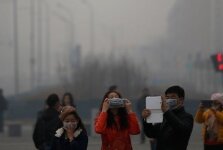
Liberia has lifted a curfew imposed to curb Ebola in an effort to let church-goers attend New Year’s Eve services, a government official has said.
Worshippers should avoid over-crowding and touching to prevent contagion, the deputy information minister said.
Health agencies did not comment directly on the one-night suspension, but warned against complacency.
Liberia’s government had hoped for an Ebola-free Christmas, but the disease has continued to claim lives.
The virus has killed nearly 8,000 people, mostly in Sierra Leone, Liberia and Guinea, where it was first identified in March.
‘Great concern’
Liberia’s President Ellen Johnson-Sirleaf had ordered the lifting of the curfew so that the traditional New Year’s Eve services could be held, Isaac Jackson, the deputy information minister, told the BBC.
Liberia is a deeply religious society, where Christians make up the majority and attendance at church is a key part of life.
Confirming the lifting of the curfew, from midnight to 0600 GMT, Mr Jackson said it would come into force again the following night and anyone who broke it would be arrested.
Churches should take preventative measures including hand-washing and temperature-testing, Mr Jackson said.
The World Health Organization said people should keep up “social distancing” measures, Reuters reported.
Medical charity Medecins Sans Frontieres (MSF) said that while progress had been made in curbing the disease, it was of “great concern to everyone at MSF that the population is now much less vigilant about Ebola and health promotion messages are being pushed aside”, Reuters said.
Ebola virus disease (EVD)

Symptoms include high fever, bleeding and central nervous system damage
- Spread by body fluids, such as blood and saliva
- Fatality rate can reach 90% – but current outbreak has mortality rate of about 70%
- Incubation period is two to 21 days
- There is no proven vaccine or cure
- Supportive care such as rehydrating patients who have diarrhoea and vomiting can help recovery
- Fruit bats, a delicacy for some West Africans, are considered to be virus’s natural host





